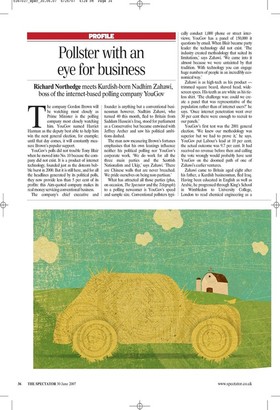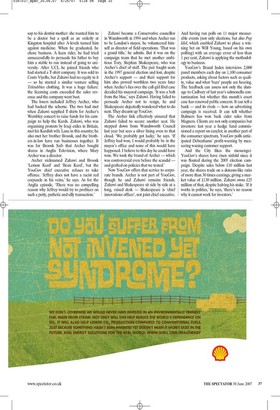Pollster with an eye for business
Richard Northedge meets Kurdish-born Nadhim Zahawi, boss of the internet-based polling company YouGov The company Gordon Brown will be watching most closely as Prime Minister is the polling company most closely watching him YouGov named Harriet Harman as the deputy best able to help him win the next general election, for example; until that day comes, it will constantly measure Brown's popular support.
YouGov's polls did not trouble Tony Blair when he moved into No. 10 because the company did not exist. It is a product of intemet technology, founded just as the dotcom bubble burst in 2000. But it is still here, and for all the headlines generated by its political polls, they now provide less than 5 per cent of its profits: this Aim-quoted company makes its real money servicing conventional business.
The company's chief executive and founder is anything but a conventional businessman however. Nadhim Zahawi, who turned 40 this month, fled to Britain from Saddam Hussein's Iraq, stood for parliament as a Conservative but became entwined with Jeffrey Archer and saw his political ambitions dashed.
The man now measuring Brown's fortunes emphasises that his own leanings influence neither his political polling nor YouGov's corporate work. 'We do work for all the three main parties and the Scottish Nationalists and Ukip,' says Zahawi. 'There are Chinese walls that are never breached. We pride ourselves on being non-partisan.'
What has attracted all those parties (plus, on occasion, The Spectator and the Telegraph) to a polling newcomer is YouGov's speed and sample size. Conventional pollsters typically conduct 1,000 phone or street interviews; YouGov has a panel of 150,000 it questions by email. When Blair became party leader the technology did not exist. 'The industry created methodology that suited its limitations,' says Zahawi. 'We came into it almost because we were untainted by that tradition. With technology you can engage huge numbers of people in an incredibly economical way.'
Zahawi is as high-tech as his product — trimmed square beard, shaved head, widescreen specs. His teeth as are white as his tieless shirt. 'The challenge was: could we create a panel that was representative of the population rather than of intemet users?' he says. 'Once internet penetration went over 30 per cent there were enough to recruit to our panels.'
YouGov's first test was the 2001 general election. 'We knew our methodology was superior but we had to prove it,' he says. YouGov put Labour's lead at 10 per cent; the actual outcome was 9.7 per cent. It had received no revenue before then and calling the vote wrongly would probably have sent YouGov on the doomed path of one of Zahawi's earlier ventures.
Zahawi came to Britain aged eight after his father, a Kurdish businessman, fled Iraq. Having been educated in English as well as Arabic, he progressed through King's School in Wimbledon to University College, London to read chemical engineering as a sop to his dentist mother: she wanted him to be a doctor but a spell as an orderly at Kingston hospital after A-levels turned him against medicine. When he graduated, he chose business. A keen rider, he had tried unsuccessfully to persuade his father to buy him a stable to run instead of going to university. After UCL he joined friends who had started a T-shirt company. It was sold to Coats Viyella, but Zahawi had no equity in it — so he started a similar venture selling Teletubbies clothing. It was a huge failure: the licensing costs exceeded the sales revenue and the company went bust.
The losers included Jeffrey Archer, who had backed the scheme. The two had met when Zahawi supplied T-shirts for Archer's Wembley concert to raise funds for his campaign to help the Kurds. Zahawi, who was organising protests by Iraqi exiles in Britain, met his Kurdish wife Lana in this country; he also met her brother Broosk, and the brothers-in-law have run businesses together. It was for Broosk Saib that Archer bought shares in Anglia Television, where Mary Archer was a director.
Archer nicknamed Zahawi and Broosk 'Lemon Kurd' and 'Bean Kurd', but the YouGov chief executive refuses to take offence. 'Jeffrey does not have a racist red corpuscle in his veins,' he says. As for the Anglia episode, 'There was no compelling reason why Jeffrey would try to profiteer on such a petty, pathetic and silly transaction.'
Zahawi became a Conservative councillor in Wandsworth in 1994 and when Archer ran to be London's mayor, he volunteered himself as director of field operations. 'That was a grand title,' he admits. But it was on the campaign team that he met another ambitious Tory, Stephan Shakespeare, who was Archer's chief of staff. The pair fought seats in the 1997 general election and lost, despite Archer's support — and their support for him also proved worthless two years later when Archer's lies over the call-girl libel case derailed his mayoral campaign. 'It was a bolt from the blue,' says Zahawi. Having failed to persuade Archer not to resign, he and Shakespeare dejectedly wondered what to do next. They dreamt up YouGov.
The Archer link effectively ensured that Zahawi failed to secure another seat. He stepped down from Wandsworth Council last year but sees a silver lining even to that cloud. 'We probably got lucky,' he says. 'If Jeffrey had won, I would probably be in the mayor's office and none of this would have happened. I believe to this day he could have won. We took the brand of Archer — which was controversial even before the scandal — and grafted on policies that we tested.'
Now YouGov offers that service to corporate brands. Archer is not part of YouGov, though he and Zahawi remains friends. Zahawi and Shakespeare sit side by side at a long, raised desk — Shakespeare is 'chief innovations officer', not joint chief executive.
And having run polls on 11 major measurable events (not only elections, but also Pop Idol, which enabled Zahawi to place a winning bet on Will Young, based on his own polling) with an average error of less than 1 per cent, Zahawi is applying the methodology to business.
YouGov's Brand Index interviews 2,000 panel members each day on 1,100 consumer products, asking about factors such as quality, value and what 'buzz' people are hearing. The feedback can assess not only the damage to Cadbury of last year's salmonella contamination but whether this month's court case has renewed public concern. It can tell a bank — and its rivals — how an advertising campaign is received. It can tell whether Bulmers has won back cider sales from Magners. Clients are not only companies but investors: last year a hedge fund commissioned a report on easyJet; in another part of the consumer spectrum, YouGov polls anticipated Debenhams' profit-warning by measuring waning customer support.
And the City likes the messenger. YouGov's shares have risen sixfold since it was floated during the 2005 election campaign. Despite sales below £10 million last year, the shares trade on a dotcom-like ratio of more than 30 times earnings, giving a market value of £130 million Zahawi owns £25 million of that, despite halving his stake. 'If it works in politics,' he says, 'there's no reason why it cannot work for investors.'



















































































 Previous page
Previous page